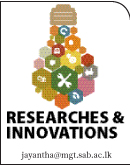 The main purpose of the study was to investigate the effect of graduates‘ self-efficacy in graduates employability. Accordingly, this study employed a rigorous quantitative research method to investigate the relationship between graduates’ self-efficacy and graduates’ employability in Sri Lanka and used reliable measurement tools and performed advanced statistical techniques to provide a valuable insight that influence graduates’ employability outcomes.
The main purpose of the study was to investigate the effect of graduates‘ self-efficacy in graduates employability. Accordingly, this study employed a rigorous quantitative research method to investigate the relationship between graduates’ self-efficacy and graduates’ employability in Sri Lanka and used reliable measurement tools and performed advanced statistical techniques to provide a valuable insight that influence graduates’ employability outcomes.
Empirical review
Employability, as defined in the literature, refers to the abilityto secure and maintain employment that is not only suitable but also aligns with individuals’ skills, knowledge, and career aspirations. On the other hand, graduates’ employability encompasses a range of skills, attributes, and experience that enable graduates to secure and maintain employment as well as to succeed and progress in their careers.
However, employability is not merely about obtaining a job after graduation; it also involves the ability to adapt to changing job markets, continuously develop new skills, and effectively manage one’s career over time. Consequently, the employability of graduates has garnered increasing attention from educational institutions, policymakers, and employers, and the concept of employability has been increasingly viewed as a set of capabilities that graduates must possess to navigate the complexities of the job market.
In today’s rapidly evolving labour market, employability is also a concern for employers, who are seeking graduates with the skills and attributes needed to thrive in today’s competitive and rapidly changing work environment. Such capabilities include technical and academic skills and a range of soft skills, such as communication, teamwork, problem-solving, and adaptability, which are highly valued by employers. As a result, graduates who actively engage in activities that enhance their employability are more likely to succeed in the job market and conclude that graduates’ employability is a complex and dynamic construct which is influenced by a range of individual, educational, and external factors.
Self-efficacy, a concept refers to an individual’s belief in their ability to successfully perform specific tasks or achieve desired outcomes, as a key factor which influences graduates’ employability and it plays a vital role in shaping their career choices, persistence in goal pursuit, and overall job performance. Graduates’ self-efficacy, on the other hand, pertains to an individual’s belief in their ability to accomplish tasks and achieve goals in various contexts and employability is influenced by graduates’ self-efficacy, or such beliefs which play a critical role in shaping career choices, job search behaviours, and job performance.
In the context of higher education, graduates’ self-efficacy is understood as the confidence that university students have in their ability to successfully perform tasks, achieve academic goals, and transition into the workforce. Research has consistently shown that graduates’ self-efficacy influences not only academic performance but also career choices and outcomes. Students with high levels of self-efficacy are more likely to engage in behaviours that enhance their employability, such as seeking internships, participating in extracurricular activities, and networking with professionals in their field.
Universities, as primary institutions of learning and skill development, play a crucial role in shaping the graduates’ self-efficacy beliefs of their students through carefully designed programs, such as career development workshops, internships, and experiential learning opportunities. These programs are not merely supplementary to the academic curriculum but are integral to the holistic development of students, preparing them to face the realities of the job market with confidence and competence. It means there is a strong correlation between graduates’ self-efficacy beliefs and their career aspirations, job search behaviours, and job performance outcomes.
Nevertheless, the development of self-efficacy among university students is influenced by a variety of factors, including the quality and relevance of the educational programs they are exposed to, the support and guidance they receive from faculty and mentors, and their own experiences of success. Similarly, career development workshops also contribute to the development of self-efficacy by allowing graduates to tackle real-world problems and achieve tangible outcomes.
In view of the above empirical evidence, it is evident that understanding the factors that contribute to the development of self-efficacy among university graduates is crucial for enhancing their employability and overall career success. As such, higher education institutions continue to refine and expand their programs aimed at improving graduates’ employability, and there is a need for more research that explores the specific ways in which these programs impact graduates’ self-efficacy. Given its significance, understanding the relationship between graduates’ self-efficacy and employability is essential for developing strategies that enhance graduates’ readiness for the workforce.
Research methodology
With the use of simple random sampling technique, a sample of 380 university graduates were chosen from the population of 25,890 for this quantitative study and used self-administrative questionnaire and google form to collect primary data from the respondents who were the university graduates in Sri Lanka.
The data were collected from the respondents, at once, without researcher’s interference and the data collected were analyzed using Statistical Package for the Social Sciences (SPSS-23.0) and Smart PLS 3.28 to generate results and a combination of descriptive statistics, regression analysis, and Structural Equation Modeling (SEM) was performed to test hypothesis to derive meaningful conclusions.
Further, integration of descriptive statistics, regression analysis, and SEM allowed for a comprehensive understanding of the relationships between graduates’ self-efficacy and employability through hypothesis testing. The use of these multiple analytical techniques ensured that the findings were robust and reliable, contributing to the broader literature on employability in the context of higher education sector in Sri Lanka.
Research findings
The researchfindings highlighted that graduates’ self-efficacy has a positive and significant relationship with graduates’ employability. The findings empathize that enhancing employability requires high self-efficacy. Accordingly, focusing self-efficacy on employability, graduates can better navigate the challenges of the modern workforce and achieve long-term career success. Consequently, there has been a growing interest in understanding the factors that influence graduates’ employability.
Conclusion
In view of the growing interest aimed at enhancing graduates’ employability, employers stand to benefit from understanding how graduates’ self-efficacy beliefs influence their employability. Additionally, by developing a strong sense of self-efficacy, graduates can increase their confidence in their abilities, which in turn positively influences their job search behaviours and career outcomes Further, graduates with high self-efficacy are better equipped to adapt to new roles and environments, those without, continuously learn and develop new skills, and effectively navigate career transitions .
In conclusion, graduates’ self-efficacy is a crucial determinant of employability. As such, fostering self-efficacy should be a central objective of higher education programs, with targeted interventions designed to build students’ confidence in their abilities and prepare them for successful transitions into the workforce. This paper is an extraction of the paper published in a Scopus Journal – African Journal of Biomedical Research.
 Author
Author
Dr. D. S. Peiris
Director Management & Science Institute (MSI)
Co Authors
Prof. Dr. Junainah Abd Hamid, Prof. Dr. AliKhatibi, Asso. Prof. Dr. M.Ferdous
Azam & Asso. Prof. Dr. Jacquline Tham of Management & Science University (MSU) Malaysia






